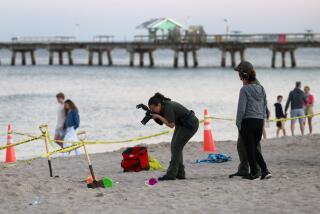Iraqi election crisis poses a test for U.S.
The barring of hundreds of mostly Sunni candidates from participating in Iraq’s upcoming elections is testing the limits of U.S. influence in Iraq even as American troops prepare to draw down later in the year.
U.S. diplomacy has shifted into high gear in recent days in an attempt to pressure Iraqi government officials into finding a way out of a crisis that many fear could seriously destabilize the country both before and after the election.
The 515 barred candidates -- the number keeps growing -- belong mostly to Sunni Arab and secularist parties that oppose the dominance of Shiite religious parties in the current government. Their exclusion risks reigniting the sectarian tensions that plunged the country into civil strife the last time Sunnis stayed outside the political process.
The candidates have been barred because of their alleged ties to the Baath Party, which ruled Iraq under the late President Saddam Hussein. A clause in Iraq’s Constitution forbids former Baathists from holding public office.
They may appeal, but it’s unclear whether the courts will have time to rule on so many cases before the March 7 election.
In a sign of the seriousness with which the crisis is being viewed, U.S. officials say they have quietly warned the Iraqis that there is a real possibility the U.S. and the international community will refuse to accept the elections as legitimate if the ban is upheld, a step that would undermine the entire U.S.-led effort to bring democracy to Iraq and that would potentially deprive the next Iraqi government of international recognition and domestic support.
In one glimmer of hope, Iraq’s election commission decided Tuesday not to publish the names of those barred, as it had said it would do this week. Instead, a commission spokesman said, it will now only release a list of approved candidates sometime next week, a delay that U.S. officials said may provide a window of opportunity to find a solution.
“I think the reason you’re having this delay is Iraqi leaders are stepping back and saying, ‘Let’s look at this,’ ” U.S. military spokesman Maj. Gen Stephen Lanza said.
The delay came after Vice President Joe Biden weighed in on Sunday, telephoning three top Iraqi officials with a proposal to delay vetting candidates until after the voting, a solution that would permit all Iraqis to participate in the election and allow time for appeals.
Many Iraqi officials “do understand the gravity of the situation, and many are now looking for a way to retreat from this path,” said one U.S. official, speaking on condition of anonymity.
But it’s difficult to find anyone in the Iraqi government prepared to stand up publicly to the secretive and powerful Accountability and Justice Commission that ordered the ban, headed by two men suspected by U.S. officials of having close ties to Iran.
Ahmad Chalabi, the commission’s chairman, was the Pentagon’s favorite to lead a new Iraqi government after the 2003 invasion, until U.S. officials discovered he was supplying information to Iran in 2004. The commission’s executive director, Ali Lami, was detained by U.S. officials in 2008 on suspicion of involvement with Iranian-backed militias. He was released in August as part of a deal involving members of the Asaib al Haq, or League of the Righteous.
Chalabi has refused to comment on the ban, and Lami denies any involvement with the Iranians or armed groups. He says the U.S. military held him for a year only because it was trying to persuade him to pass information about Chalabi’s activities.
Many Iraqis suspect that Iran, at least indirectly, is influencing the process to help ensure that its Shiite Iraqi allies do well in the elections. Chalabi and Lami are also among a slate of candidates fielded by the largest Shiite coalition, the Iraqi National Alliance, which is backed by Iran.
“Iran has a big influence in this,” independent Sunni lawmaker Mithal Alusi said. “For its own reasons, Iran doesn’t want to see a successful, democratic election in Iraq.”
So preoccupied is Iraq’s political leadership by the threat posed by Baathists, however, that most Iraqis either genuinely fear their influence or are too afraid of being branded a Baathist to speak out, U.S. officials say.
When Iraq’s parliament debated the issue Tuesday, only Mahmoud Othman, an independent Kurdish lawmaker, criticized the ban on Sunni candidates, warning of the threat posed to the process of reconciliation.
“Many people don’t agree with it, but they are afraid to move in case they are accused of being Baathists,” Othman said. “Arab Sunnis, if they speak out, they are afraid of being banned, and Shiites don’t dare because they have to be against Baathists to keep the support of the street.”
“The Americans are trying very hard, but I don’t think anyone in the Iraqi government is listening,” said Saleh Mutlak, the most prominent Sunni leader to be barred. “I don’t think the political leaders are responsible enough to try to find a solution. It needs American pressure.”
More to Read
Start your day right
Sign up for Essential California for news, features and recommendations from the L.A. Times and beyond in your inbox six days a week.
You may occasionally receive promotional content from the Los Angeles Times.






